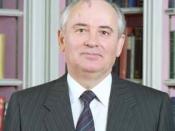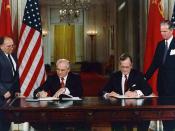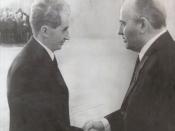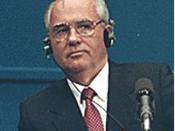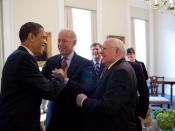Gorbachev became the Secretary General in 1985. He, who recently had managed the impossible task to be in charge of the agricultural sector, soon became well know for being an active and favorable to reforms politician. Within the party Gorbachev aimed at raising the production by strengthening the working discipline and fight corruption. He had an acceleration concept in which he arranged restrictive alcohol politics, and the strengthening of the quality of controled procedures. In 1987 he had new two new main slogans in his political thinking which were openness about the discussion of the Molotov-Ribbentrop Treaty, Stalin's genocides. And then there was reconstruction, democratization. In local elections 1988 it was for the first time possible to vote for more than one candidate to the different posts, which resulted in that politicians favorable to reforms were elected. After this All-Union elections were held, where a parliament was formed. Gorbachev received hash criticism as he reserved 1/3 of the seats for the Communist Party.
When Gorbachev called for an extraordinary party to get approval from the leading institutions about his wish to carry out long going changes it was a major turning point in Soviet political history. Gorbachev's ground for legitimacy was negative legitimacy, official nationalistic legitimacy, and charismatic legitimacy. However, Gorbachev always stated that the foundations of Leninism still were the guiding lines, and when he discussed the deeds of Stalin he was very careful and spoke only of 1 000 and 1 000 of victims. The problem was that Gorbachev wasn't consistent in his domestic politic. To secure his reforms he looked for support in both the progressive and the conservative circles, which led to that his "strip" to stand on became smaller and smaller. Gorbachev had most loyal support from the intelligentsia and the leaders of the world.
